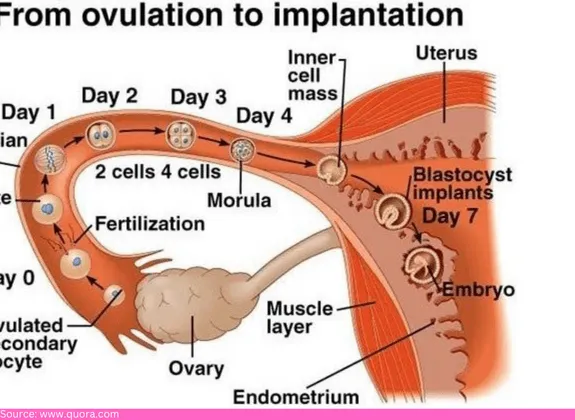For most of us, becoming a parent is a goal that is deeply rooted in our vision of a happy and fulfilling future. However, there is a possibility that you may choose to delay parenthood due to career, life goals, and not finding the right partner, among other things. Or you may want to preserve your good-quality embryos from an IVF cycle for a future pregnancy.
Dr. Nisarg Patel, an acclaimed fertility specialist at Nisha IVF, a advanced IVF centre in Ahmedabad, says that FET (frozen embryo transfer) is an excellent choice for people who wish to preserve their fertility for a future pregnancy.
Studies have shown that embryo implantation after frozen embryo transfer can be slightly delayed compared to fresh blastocyst transfers. The term “late implantation” or “delayed implantation” may be used to describe this.
What is late implantation in frozen embryo transfer?

Frozen embryos are crucial to IVF. Frozen embryos can be used to restart unsuccessful cycles. Additionally, these embryos also aid in postponing pregnancy if you wish to raise your child at a later period. Some men and women may want to explore other interests before starting a family. Others could be concerned about their health but still want to start or expand their families in the future.
A fresh (unfrozen) embryo transplant typically takes 1 or 2 days to hatch. Implantation and hatching may take 5-7 days. Frozen cells can take additional time to implant after the fertility specialist transfers the embryo.
An eminent IVF doctor in Ahmedabad, Dr. Nisarg Patel, says, “The transfer period is prolonged by up to a 5-day hatching time for frozen embryos, and this longer timeline causes late embryo implantation.”
What are the benefits of a frozen embryo’s late implantation?
When a woman freezes the good quality embryos during her first IVF cycle, the procedure is known as delayed frozen embryo transfer or “freeze all technique,” and it has several advantages, such as:
- Preserves all healthy embryos for future pregnancies without going through the cycle again.
- Enables genetic screening, considerably boosting the odds of a successful pregnancy and healthy baby.
- Enables the uterine environment to continue as normal following IVF treatment, creating natural circumstances for embryo implantation.
- Allows for single embryo transfer, thereby considerably reducing the probability of multiple pregnancies (bearing of twins or more) and the accompanying health hazards.
- Reduces the pregnancy complications of a fresh embryo transfer in an IVF cycle, such as preeclampsia, premature labor, and low birth weight.
The highly-skilled fertility specialist, Dr. Nisarg Patel, adds that freezing your healthy embryos for the future also eliminates the risk of OHS (ovarian hyperstimulation syndrome), which can be significantly high with repeated fresh embryo transfers.
Can you have a successful pregnancy with late implantation after frozen embryo transfer?
The short answer is yes; late implantation after frozen embryo transfer can result in a successful pregnancy. However, it is essential to understand the factors that can affect implantation and the potential complications that can arise from delayed implantation.
Implantation is the process by which a fertilized egg, or embryo, attaches itself to the lining of the uterus and begins to grow and develop. This process typically occurs about 6-10 days after fertilization, but it can sometimes happen later. In the case of a frozen embryo transfer, the embryo has already been created and frozen, so the timing of the transfer will determine when implantation occurs.
Several factors can affect the success of implantation and the likelihood of a successful pregnancy. One of these factors is the quality of the embryo. A healthy, high-quality embryo is more likely to implant successfully and result in a successful pregnancy. Since only the best high-quality embryos are selected to be frozen, this should be fine if stored in a cutting-edge fertility clinic like Nisha IVF Centre.
Infertility specialist Dr. Nisarg Patel adds that another factor is the timing of the frozen embryo transfer. If the transfer is done too early or too late, it can affect the success of the implantation. For example, if the transfer is done too early, the uterus may not be ready to receive the embryo and may expel it.
How late can implantation happen after the embryo transfer?
If the transfer is done too late, the uterus may have already started to prepare for the next menstrual cycle, making it less receptive to the embryo.
In general, late implantation after a frozen embryo transfer is considered to be anything that occurs more than 10 days after the transfer. While late implantation can still result in a successful pregnancy, some potential complications can arise. For example, late implantation may increase the risk of miscarriage or ectopic pregnancy.
IVF specialist Dr. Nisarg Patel explains, “An ectopic pregnancy is a potentially dangerous condition in which the fertilized egg implants outside the uterus, usually in the fallopian tube. It can be life-threatening for the mother and requires immediate medical attention.”
Another potential complication of late implantation after a frozen embryo transfer is a condition known as anembryonic pregnancy or “blighted ovum.” This occurs when the fertilized egg implants in the uterus but does not develop into an embryo and can cause the pregnancy to be miscarried. It is usually diagnosed through a combination of symptoms and an ultrasound.
Conclusion

It is not uncommon these days for people to cryopreserve their fertility for a future pregnancy through frozen embryo transfer due to various reasons, including career growth, health or financial issues, etc. And while frozen embryo transfer is a ray of light for those planning a delayed pregnancy, concerns about potential late implantation are pretty natural.
Despite the potential complications, it is important to remember that late implantation after a frozen embryo transfer can still result in a successful pregnancy. In fact, many women who have experienced late implantation have gone on to have healthy pregnancies and deliver healthy babies.
In conclusion, late implantation after a frozen embryo transfer can result in a successful pregnancy.
If you are considering undergoing a frozen embryo transfer, please discuss the potential risks and complications with a top-notch IVF specialist like Dr. Nisarg Patel so you can work together to determine the best course of action and ensure the best possible outcome.


